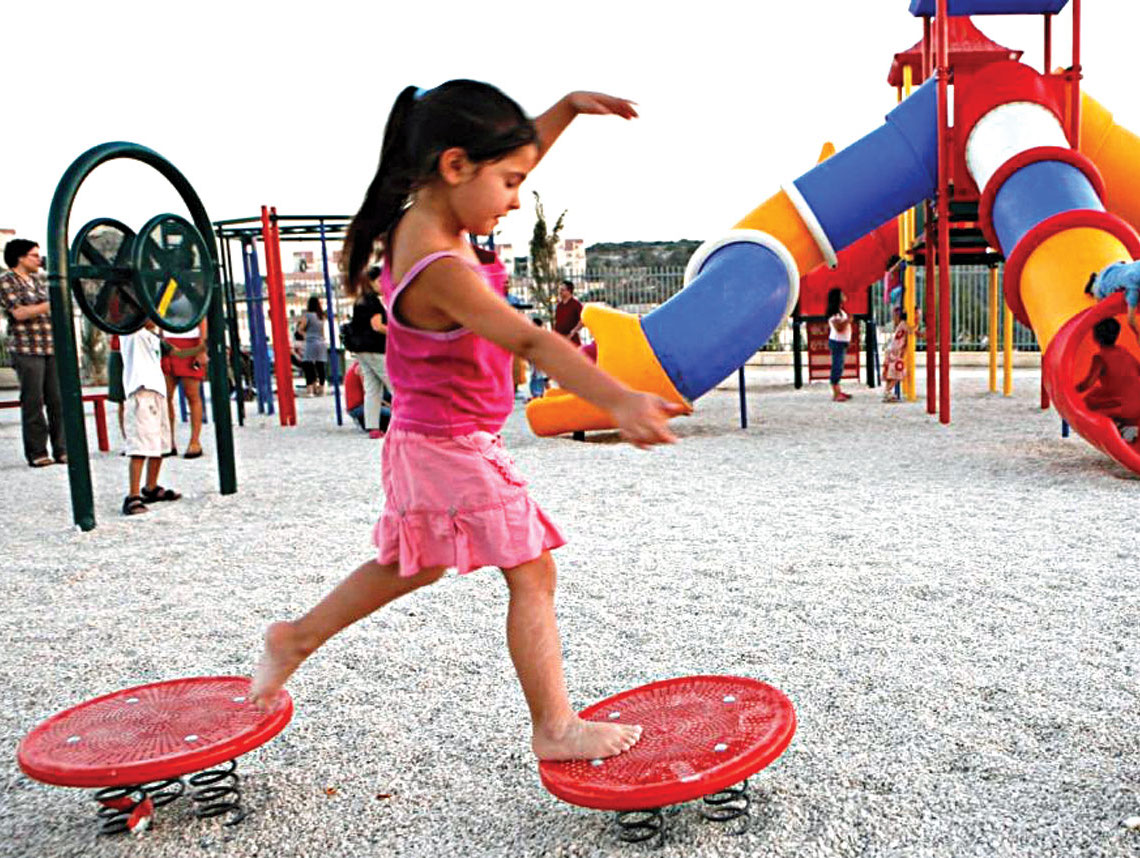 Israeli children are encouraged to play independently. Photo by Nati Shohat/FLASH90
Israeli children are encouraged to play independently. Photo by Nati Shohat/FLASH90 If you sit for an hour and observe children playing in a typical Israeli playground, you may be struck by the chaos. You will see children climbing up slides rather than sliding down them and scaling the peripherals of jungle gyms instead of using their ladders. You’ll find toddlers boldly standing on swings, running without caution, yelling and never waiting in line.
Even more striking, the adults rarely interfere with the children’s play. They offer no instruction nor correct the children who choose to use the playground equipment in an unconventional manner.
This lack of interference is indicative of two strong characteristics of Israeli culture: 1) high tolerance for the unconventional and 2) what in Hebrew is called a balagan. In the simplest sense, balagan can be translated to words like disorder, mayhem and chaos.
Balagan is the state for which a preordained order of things does not exist. People, and even entire systems, act spontaneously. In Israel, there’s balagan everywhere. And this has been proven to be a good thing.
From an early age, children learn endless social conventions pertaining to every aspect of their lives — family dynamics, social relationships and play. They are taught that certain toys correlate to certain games, specific objects belong to select domains, and that there is a right way to do things. This approach helps to fashion our young into members of a functioning society. But it lends little to imagination and creativity.
Balagan teaches them that things don’t always have a predetermined order or usage. Who is to say that you can’t climb a slide? Or that social interaction must always be polite? I believe children can learn a lot from living with disorder. I believe that balagan promotes creativity, problem-solving, and independence for children, as well as adults. This is a highly effective characteristic for entrepreneurs. I often challenge my teams, colleagues and kids, to shake up the predefined order of things and spice it with a bit of chaos.
Unstructured play — whether standing in line or using certain objects — creates ambiguity. There is no way of knowing what will happen next. This is not only socially and intellectually challenging; it also can be enjoyable, bringing an element of surprise into the play environment.
In an organized system, a new child will automatically join the end of the line. No interaction is necessary among the children, as rules dictate proper behavior for this situation. In the absence of such a system, a new child is an unknown factor to whom the other children are suddenly forced to relate. They take into account their desires, needs and abilities. With no rules to fall back on, they resolve the confrontation themselves.
“Rather than approaching disorder as a problem, we see it as being pregnant with ambiguity that can potentially be a resource for new thinking and new ‘ordering’ work,” says British management theorist Janice Denegri-Knott. In other words, social situations laden with ambiguity help develop a child’s problem-solving skills.
Furthermore, balagan goes hand-in-hand with freedom of thought and creativity. As anticipated, recent experiments into the effects of disorderly environments on behavior concluded that while orderly environments encourage conventional behavior, messy ones stimulate the generation of new insights.
Research also points to a strong connection between the extent of freedom and autonomy given to a child and the creativity generated by that child. As noted above, Israeli parents don’t generally offer much instruction or corrective behavior regarding the way children play. From this perspective, a child is an autonomous being capable of and expected to act independently. And when children are allowed to find their own way using the objects around them, creativity takes root.
Balagan is a term commonly used in everyday Israeli life and certainly one of the most well-known Hebrew words among non-native speakers. Israel is a country where things change from moment to moment. No wonder the word is so relevant. Balagan is manifest in almost every aspect of an Israeli’s life: from waiting in the supermarket line, to getting on a bus, to visiting a governmental office or participating in a political demonstration. There is always balagan.
While this may seem chaotic to an outsider, in Israel, it is simply the way social interactions operate. Surprisingly, it proves to be effective. With fewer social conventions and organized social behavior, balagan can invite conflict and frustration, but it also demands on-the-spot solutions for specific situations and people, as opposed to relying on an all-purpose rule supposedly fit for any circumstance. So the mechanism of disorder in fact creates order.
As an entrepreneur, I see many benefits to being disorganized. For example, studies have shown that messy desks convey the vivid signatures of people with creative, agile minds. In a rare consumer-related study into the effects of messy environments, researchers concluded that a cluttered environment may lead to favorable outcomes in decision-making, such as efficiency in the construction of choice options.
Messiness, the authors concluded, actually produced “better” thinking. Why is that? Jerrold Pollak, a neuropsychologist, argues that total organization is a futile attempt to deny and control the unpredictability of life.
He has a point.
If life is naturally disorganized, wouldn’t developing the skills necessary to deal with its unpredictability be more effective than trying to create order?
When you think about it, disorder is incredibly flexible and adaptable. Unlike order, which is fragile and can be destroyed by any deviation from its well-defined boundaries, balagan encourages adapting and adopting new and unforeseen parameters. It encourages us and our children to reconsider continuously our deepest biases and assumptions regarding the “organization of things” and allows us to consider alternative possibilities.
Isn’t that what entrepreneurship is all about?






















 More news and opinions than at a Shabbat dinner, right in your inbox.
More news and opinions than at a Shabbat dinner, right in your inbox.